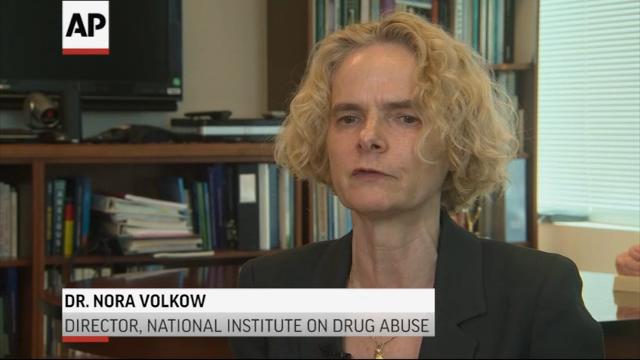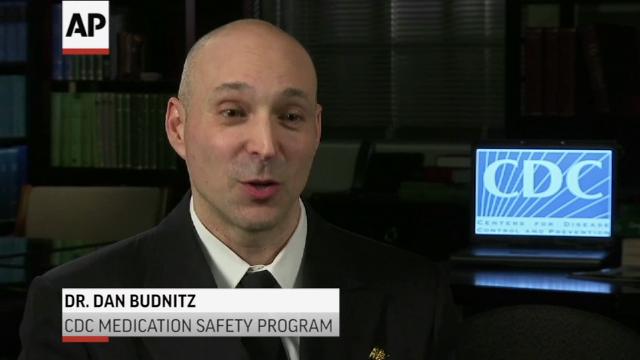 Slippery battle for patients addicted to opioids
Slippery battle for patients addicted to opioids The White House now has a plan to fight the opioid crisis
The White House now has a plan to fight the opioid crisis Why the opioid crisis wasn't declared a national emergency
Why the opioid crisis wasn't declared a national emergency Why is fentanyl so dangerous
Why is fentanyl so dangerous Volunteer describes dangers of sharing syringes
Volunteer describes dangers of sharing syringes Opioid prescriptions have tripled since 1999
Opioid prescriptions have tripled since 1999 Some heroin addicts turning to meth
Some heroin addicts turning to meth Trying to stop the opioid epidemic is an uphill battle
Trying to stop the opioid epidemic is an uphill battle Science Says: Why Are Opioids so Addictive?
Science Says: Why Are Opioids so Addictive? The search is on for opioid alternatives
The search is on for opioid alternatives Toddlers Latest Victims of Opioid Epidemic
Toddlers Latest Victims of Opioid Epidemic Politics of pain: Lobbyists fought opioid limits
Politics of pain: Lobbyists fought opioid limits
Two decades ago, the Valcarcels' lives changed in an instant.
Jim Valcarcel and his wife, Dorothy, were nearly home from a Los Angeles business trip when a Nissan Sentra jumped the Interstate 10 median at 51st Avenue and crashed head-on with the Valcarcels' BMW sedan.
The Nissan’s driver died immediately. Jim and Dorothy Valcarcel each spent four months in a hospital with severe trauma.
Jim Valcarcel’s injuries were life altering. His legs shattered into bits of bone. His right leg and right hip were reconstructed with metal screws and plates. He often uses a cane to walk.
“Doctors have categorized me as totally disabled,” said Valcarcel, 63, of Cottonwood. “The reality is I can walk. I can drive. I come down to (Phoenix) once a month and see my pain specialist.”
But the pain never leaves.
He manages it with a regimen of powerful pills prescribed by his doctor, J. Julian Grove, a specialist at Phoenix-based Pain Consultants of Arizona.
Pain patients worry about new policies
Valcarcel said his biggest worry isn’t injuries sustained two decades ago. Like many chronic-pain sufferers across the state and nation, he frets about whether he'll have access to pain-relieving medication as policymakers pass laws that limit prescriptions to curb an opioid epidemic that accounted for most of the nation's 64,070 drug overdose deaths in 2016.
MORE: Opioid overdoses killed 716 people in Arizona in 6-month span
In Arizona, Gov. Doug Ducey declared a public health emergency last year and directed the Arizona Department of Health Services to complete a report with recommendations on how to slow the epidemic.
That led to an Arizona Legislature special session this week for a bill called the Opioid Epidemic Act, legislation that would limit initial pain-pill fills to 5 days for “opioid naïve” patients, and impose a maximum dosage limit for many others seeking new prescriptions.
Ducey's bill followed the Arizona Department of Health Services' opioid action plan released last fall that recommended prescribing restrictions, tougher oversight of pain-pill dispensing, continuing medical education for doctors and treatment for people battling addiction.
Ducey, legislative leaders and state health officials said the overriding goal is to save lives.
2 deaths per day in Arizona
Arizona health officials said more than two Arizonans died every day on average from opioids in 2016.
As part of the Republican governor's emergency declaration last year, law enforcement, emergency medical and health care providers must report all suspected overdoses and deaths within one week.
The running tally is displayed prominently on the state health department's website: 816 deaths, 5,377 overdoses and 530 babies exposed to opioids in the womb since June 2017.
MORE: 5 fixes Arizona health officials want to reduce opioid deaths
The figures collected since June 2017 suggest the opioid death rate may have accelerated compared to 2016, though officials cautioned the numbers are preliminary. The state won't be able to confirm the deaths are the result of opioids until county medical examiners analyze toxicology tests and complete investigations.
The problem has been two decades in the making.
Doctors are cutting back on opioid prescriptions but not by nearly enough, federal health officials say. Wochit
Powerful new drugs like OxyContin hit the market in the mid-1990s, and doctors were increasingly encouraged — in some cases, mandated — to assess a patient's pain levels during appointments.
State leaders believe new laws and regulations are desperately needed to prevent more addiction and treat those who are now dependent on prescription pain pills. Four out of five heroin users began by using prescription opioids, state officials said.
MORE: Gov. Doug Ducey's opioid plan seeks to limit initial pain-pill fills
Ducey’s Opioid Epidemic Act caps the dosages of opioids that most new patients can take each day. But the bill would allow people now on pain pills to ask their doctor to extend existing prescriptions.
"We don’t want to limit patients' access to the medication that they need to control pain," said Cara Christ, director of the Arizona Department of Health Services.
Tapering pain pills
Valcarcel said for a decade his pain medication did not change.
Three times a day, he would take a 60 mg pill of the powerful painkiller OxyContin — one pill every 8 hours. His doctor also prescribed Percoset for breakthrough pain.
But this fall, his doctor said his daily dosage was too high. He would need to taper his pain medication to one-third of what he had taken for the past decade.
Last September, ADHS released its opioid action plan, which recommended a maximum dosage of 90 morphine milligram equivalents (MME) per day for most people. The reason: Risk of overdose for prescriptions at that potency increases 10 times compared to lower opioid strengths.
Arizona is one of more than a dozen states that have either recommended or required maximum dosages. These state plans are largely built off Centers for Disease Control and Prevention guidelines issued in 2016.
The measure, MME, varies based on the type of opioid. The limit for oxycodone, the active ingredient in OxyContin, would be 60 mg each day, according to the CDC.
"They are withdrawing my medication, slowly but surely," Valcarcel said. "I am going to have to learn to live on less medication."
Valcarcel said that his doctor reduced his third daily pill of OxyContin to 40 mg, with the other two pills remaining at 60 mg. When he returns to the doctor next month, he expects his prescription will be reduced to two daily pills at 40 mg and a third at 60 mg.
He said activities such as walking have become more laborious since he began tapering.
Because Ducey's opioid bill did not adopt the ADHS recommendation that most people taper from high dosages, Valcarcel said he is hopeful that his doctor will change his care plan during next month's visit. Grove, his doctor, did not return multiple calls from The Arizona Republic.
Two doctor groups, the Arizona Medical Association and the Arizona Osteopathic Medical Association, both urged the Ducey administration to introduce a bill that does not require existing pain patients to taper dosages.
Many patients on high dosages of pain medication can function and be productive under proper care, the doctor groups said in a December letter to ADHS.
"Imposing this type of a requirement on healthcare delivery would create arbitrary sub-classes of patients and likely result in unnecessary and disproportionate patient suffering," the letter stated.
Valcarcel said he believes that chronic pain patients like him are being unfairly targeted as states combat the opioid epidemic.
He acknowledges many heroin users started on prescribed pain pills. But he said that it's unfair to impose new restrictions on chronic-pain patients who have followed their doctors' recommendations for years without a problem.
"We are being treated as if we are guilty until we prove we are innocent," Valcarcel said.
READ MORE:
Arizona sues Insys Therapeutics, three doctors over opioids
John Kapoor, billionaire founder of Insys, to fight charges in opioid case
4 Mohave County doctors prescribed 6 million opioid pills in 1 year
Phoenix to sue prescription drug makers over costs of opioid crisis
Family seeks answers after woman dies during Arizona rehab stint
Hepatitis C: The public-health worry lurking behind the opioid epidemic
Arizona police used opioid overdose-reversing drug once a day this summer
Opioid, heroin deaths surge in Arizona
Arizona man lived to tell of his success story fighting opioid addiction














Join the Conversation
To find out more about Facebook commenting please read the Conversation Guidelines and FAQs